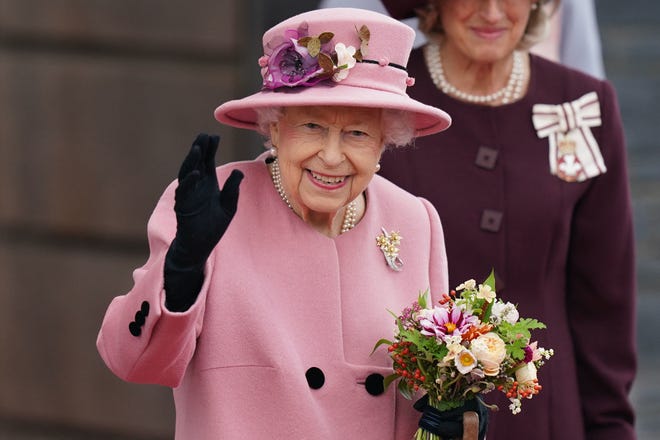Our recollections of Queen Elizabeth II
Queen Elizabeth II, the longest reigning British monarch, has been with us for so long that many of us cannot recollect when she was not on the throne. She was a much-loved monarch who had endeared herself so much to her British subjects and more so to other citizens of the world. It is no […]

Queen Elizabeth II
Queen Elizabeth II, the longest reigning British monarch, has been with us for so long that many of us cannot recollect when she was not on the throne. She was a much-loved monarch who had endeared herself so much to her British subjects and more so to other citizens of the world. It is no wonder that at her sudden death on Thursday the tributes from all corners of the world were so effusive and fulsome. In the United Kingdom (UK) itself, it seems as if everything has grounded into a standstill as the nation mourns the monarch that most of the country had known for all its lives.
When she inherited the throne in 1952, at the tender age of 25, Nigeria was still a British colony, and most of us were not even born then. A date for our independence was also not in sight. We were all practically British subjects living under the tutelage of the British Governor-General in Lagos, the nation’s capital, and his lieutenants in the regional capitals of Kaduna, Enugu, and Ibadan. At the local levels, we had divisional officers who were British and whose roles were akin to the present-day local government chairmen. There were British citizens heading ministries and departments as permanent secretaries and directors.
- FG urges states to domesticate the ACT protecting persons with disabilities
- Over 700,000 people commit suicide annually – WHO
Major corporations were owned and manned by the British. We were still using the British currency, the pound, shilling, and pence which had the face of the queen on them. When I was enrolled in the primary school in Maiduguri in January 1960, the country was just preparing for independence that year. The schools were modelled after British schools with a preponderance of British teachers. The elite secondary I went to, Government College Keffi, was a replica of such schools in Britain complete with all the quaint customs and traditions. Elsewhere in the country, we had a Kings College in Lagos and a Queens College in Ilorin.
Even after independence, the Queen remained our Head of State till 1963 when we became a republic. Thereafter the Queen and all she represented were still omnipresent. The colonial mentality was pervasive post-independence and it would take years for our pragmatic leaders who inherited the mantle of leadership to wean us. Those of us who were privileged to be in the young universities of the time would start to raise legitimate questions relating to our national pasts.
In the 1970s the universities in Zaria, Ibadan, and Ife were hotbeds of nationalistic outpourings. Maybe a change of focus in the study of our proud rich past helped, including having those lecturers courageous enough to advance the progressive narratives. I refer to lecturers we had in Zaria such as Dr Yusuf Bala Usman, Dr. Patrick Wilmot, and Professor Abdullahi Smith, and their types who helped to instill pride into our being Africans, far from being inferior to any other race.
I lived in Britain in the late 1970s and early 80s as a post-graduate student at the University College of Swansea, Wales. When I arrived there in the autumn of 1979 the Queen was many years into her long reign. Like most other Nigerians, our heads were high up. We were coming from a peaceful country, with a buoyant economy, and the Naira was almost one to one pound. On the other hand, Great Britain was in great distress and was falling apart. There was a civil war going on in Northern Ireland sapping the energies of the country and the troubles even overflowing to the mainland. You could not walk the streets of London without the fear of a bomb going off.
Those were harrowing times for the UK. The Irish agitation even rubbed off on the Scots and the Welsh to step up their agitation for some form of separation. Where I lived in Swansea, I watched the embryonic stages of agitation for the recognition of the Welsh language and the call for devolution by the Welsh Nationalist Party, the Plaid Cymru. Elsewhere in the country, the trade unions were holding the new Her Majesty’s government, led by Margaret Thatcher, by the jugular, shutting down the country at every opportunity and exacerbating an already bad economic situation. Things were so grim that the UK, like any other troubled economy, was heading to the IMF for a bailout.
Somehow Margaret Thatcher stood firm and was able to overcome the challenges and pull Britain away from the precipice. In all these one could see the adroit hands of the Queen and her supervision influence on the politicians to sort out knotty political situations in the country. Over the years that followed they have been able to stop the killings in Northern Ireland and devolve powers to the assemblies created for the Irish in Belfast, Welsh in Cardiff, and Scots in Edinburgh.
I have never met the Queen, but I have had the opportunity to meet the new king. He was the Prince of Wales when he came to visit Maiduguri in March 1990. I was posted in the Government House that year as the permanent secretary and was privileged to be intimate part of all the arrangements to receive and accommodate him and his late wife, Diana, the Princess of Wales. Our condolences to King Charles III on the passing on of his mother. We also wish him a long and fruitful reign.
